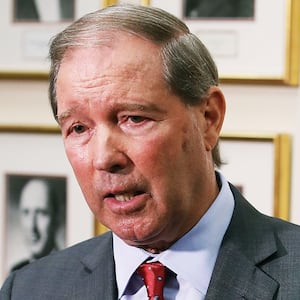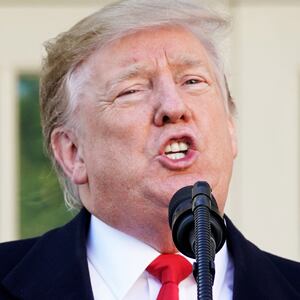As President Trump again floats the prospect of declaring a national emergency to claim new funding for his wall, the tensions that underlie conservatism in the Age of Trump are surfacing.
Once upon a time, Donald Trump, Noel Francisco, the Trump administration’s solicitor general, and Jay Sekulow, one of the president's personal lawyers, each took a much different approach when unilateral executive action encroached upon authority vested in the Congress. They hated it.
Back in November 2014, in the face of an impasse with Congress over immigration, Barack Obama announced his own “Immigration Accountability Executive Action,” and Citizen Trump would have none of it, tweeting that “Repubs must not allow Pres Obama to subvert the Constitution of the US for his own benefit & because he is unable to negotiate w/ Congress.”
ADVERTISEMENT
Obama’s efforts were finally blocked by the courts, in part thanks to the efforts of Sekulow, whose clients included about two dozen Republican senators—Sen. Mitch McConnell among them —Republican congressmen, and conservative interest groups. In an amicus brief to the U.S. Court of Appeals for the Fifth Circuit, Sekulow compared Obama’s actions to Harry Truman’s steel seizure during the Korean War, while also hinting that Obama was a tyrant.
Sekulow wrote: “The founding fathers intentionally separated these powers among the branches, fearing that a concentration of power in any one branch, being unchecked, would become tyrannical.”
Now Trump occupies the Oval Office—and running roughshod over Congress and the Constitution apparently isn’t the taboo that it once was.
As for Francisco and Sekulow, they also successfully challenged a series of recess appointments President Obama had made without first seeking and obtaining the advice and consent of the Senate.
Six years ago, Obama claimed Senate approval was unnecessary because he had made those appointments when Congress was merely in “pro forma” session. Francisco, then a partner at Jones Day, and his client, Noel Canning, and Sekulow and his client, then-House Speaker John Boehner, didn’t see it that way, and for that matter neither did McConnell.
Francisco argued to the Supreme Court that “As much as Presidents may desire an escape-hatch from Senate confirmation, the Constitution does not provide one.” He also stressed that the separation of powers “‘protects against the abuse of power”’ that ‘is critical to preserving liberty.’”
As for Sekulow, he contended that “Under the Separation of Powers Doctrine, the Executive and Legislative Branches of Government Are Co-Equal and the President Has No Authority to Overrule Congress’s Determination that It Is in Session.” For their part, McConnell and 44 Republican Senate colleagues repeatedly accused Obama of seeking to “usurp” their powers.
In the end, the Court unanimously agreed and struck down Obama’s appointments as unconstitutional. But at the same time, the high court signaled that it saw a parallel between Obama’s recess appointments and the steel seizure case, Youngstown Sheet & Tube Co. v. Sawyer, which was cited and quoted from in both the majority opinion written by Justice Stephen Breyer, a Clinton appointee, and the concurrence written by the late Antonin Scalia.
Now, as another shutdown looms, the divide among conservatives is in plain sight.
Sen. Lindsey Graham, one of the senators who challenged Barack Obama, has pivoted 180 degrees on unilateral executive action. Graham has tweeted: “Time for President @realDonaldTrump to use emergency powers to build Wall/Barrier.”
McConnell, on the other hand, doesn’t appear to have budged from his position that Congress’ power of the purse comes with the power to say “no” — even to this president. In McConnell’s words: “I’m for whatever works, which means avoiding a shutdown and avoiding the president feeling he should declare a national emergency.”
His sentiments have been seconded by other Senate Republicans. Sen. John Cornyn, the No. 2 Republican in the Senate, labeled the use of emergency powers “a dangerous step”, and tackled the constitutional challenge head on: “The whole idea that presidents—whether it’s President Trump, President Warren or President Sanders —can declare an emergency and somehow usurp the separation of powers and get into the business of appropriating money for specific projects without Congress being involved, is a serious constitutional question.”
A presidential declaration of emergency is a vehicle for packaging a major legislative loss as a political win. It permits Trump to project strength in defeat.
As for the Supreme Court, seven of the nine justices who ruled against Obama’s recess appointments remain on the bench, along with Trump’s two appointees, Neil Gorsuch and Brett Kavanaugh. In the aftermath of Justice Ginsburg’s overt criticism of Trump’s candidacy and Ginni Thomas, Justice Thomas’ wife, having lobbied Trump at the White House against women and transgender soldiers serving in the military, it will be hard to discount the role of politics in the court’s decision should Trump declare an “emergency.”
Meanwhile, Trump and his lawyers should expect to see their own words thrown back at them.







